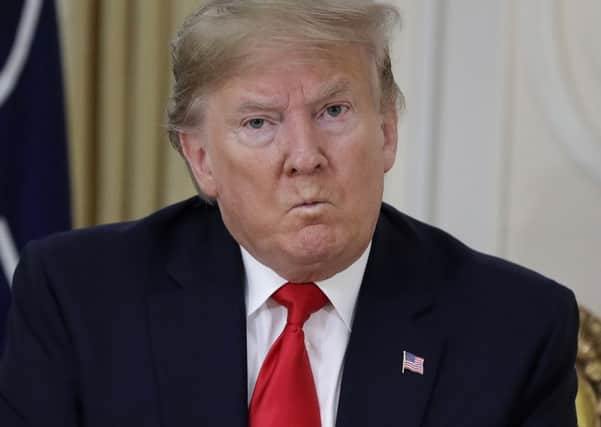Nato: Is Donald Trump trying to bend historic alliance to breaking point? – Martyn McLaughlin


Whether it is his attendance at the G20 or the United Nations, Donald Trump’s participation in international summits brings with it an air of dread and anxiety that will be familiar to many families at this time of the year.
Yes, we know great aunt Mabel will spend the entirety of Christmas dinner complaining about how her hip replacement was carried out by a doctor from One of Those countries, while smothering the free range, dry-aged, bronze-feathered turkey that cost £85 from Waitrose with ketchup, but well, she’s family. So just assume an awkward politeness and bite your fork if need be.
Advertisement
Hide AdAdvertisement
Hide AdSo it is with the US president, currently in the UK for a gathering of Nato’s heads of state, an event which is being downplayed as low key and most definitely not a summit.
In part this is because not even the most pessimistic observer of the long-running catastrophe that is British politics thought the event, scheduled long ago, might ever coincide with the final weeks of a general election campaign.
Boris Johnson’s camp, exhibiting a rare and fleeting understanding of the public mood, know Mr Trump is about as popular in Britain as smallpox, and they are nervous – with good reason – that he will stick his nose in and overly praise their man.
But the apprehension runs deeper. It cuts to the core of Nato, and the age-old global jousting for influence and power. The historic military alliance was formed 70 years ago, but rather than sparking fond reflections, let alone celebrations, the anniversary arrives at a time when Nato’s very existence is under threat.
Giddy subservience to autocrats
The folly of taking Mr Trump at his word is clear and so we should treat with scepticism, if not outright disdain, the apparent endorsement of the alliance he gave yesterday, insisting that it “serves a great purpose”.
He did not expand on what that purpose was, and quickly resorted to one of his longstanding transactional grievances with his European allies, complaining of how the US was bearing an unfair and disproportionate financial burden for defence in the region.
“The world has changed a lot and Nato is changing right now,” Mr Trump added. “I’ve become a bigger fan of Nato because they have become more flexible.”
The question, however, is how far Mr Trump can bend Nato to his will before it breaks. He has demonstrated no desire to promote or reinforce the alliance’s underlying principle of collective defence, and at a time when a resurgent Russia is gaining footholds in the Middle East and waging complex disinformation campaigns – and worse – on western countries, the old conventions no longer seem fit for purpose.
Advertisement
Hide AdAdvertisement
Hide AdTo change that and up its game, Nato requires cohesion – or at the very least, leaders who recognise the importance of multilateral diplomacy, and who treat autocrats with contempt instead of giddy subservience. Such qualities are sorely lacking in Mr Trump, who has done more than any other US president to undermine our shared security and values.
Yet, he is not the only demagogue in statesman’s clothing brandishing stones inside Nato’s glass house. Turkey’s president, Recep Tayyip Erdogan, is an ally in name only, having brazenly purchased an S-400 missile defence system from the Russians, and drawn international condemnation for his invasion of northern Syria. There have already been reprimands, and others will surely follow, but they will amount to little more than wrist slapping. Turkey’s unique geopolitical authority – a buttress between Europe, the Middle East, and Russia – ensures it will retain membership.
Sacrifice and camaraderie
That leaves Nato in an awkward position, especially if Mr Erdogan demands it supports his fight against the Kurds. Expect that to be a key issue when the 29 members gather today, and one that will go unresolved, stoking tensions further.
Instead, the customary communiqué that emerges from the three-hour meeting at Grove Hotel in Hertfordshire will probably be peppered with garden variety statements about Russia and China, with a focus on spending goals. The amount of money each government commits from its GDP is significant, but it is not the most pressing concern, despite Mr Trump’s efforts to keep it at the top of the agenda.
The fact is that expenditure and military hardware is only one measure of Nato’s strength. Even more crucial to its integrity and effectiveness is political credibility, and while it is so riven by discord and disruptive acts of self-harm, the alliance is in a weakened state.
The sacrifice and camaraderie which led to its formation in 1949 seem like part of a long-forgotten history, and in an era when national self-interest is usurping collectivism, it is hard to see how those precious values can be reasserted. Even in the foothills of the festive period, there is next to no goodwill in Nato’s dysfunctional family.
When Bill Clinton addressed fellow Nato leaders at a 1999 summit in Washington to mark its 50th anniversary, he invoked Roosevelt and said that the march of history meant the US had no choice as to whether it played a leading role in the world. “The only question is whether we will play it well or ill,” quipped Mr Clinton. His audience recognised the humour with which the remark was delivered, but two decades on, the US ambivalence is no laughing matter.
